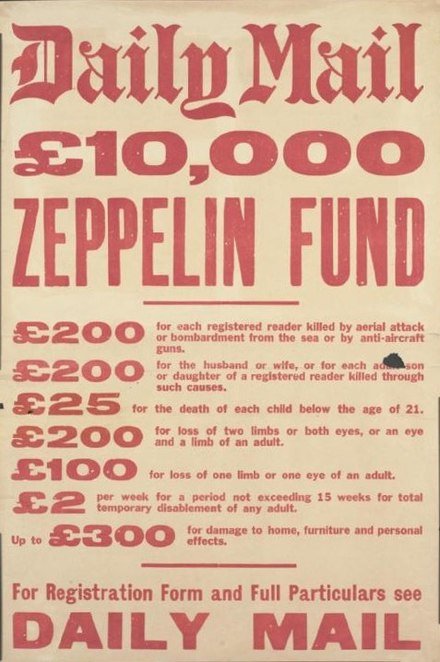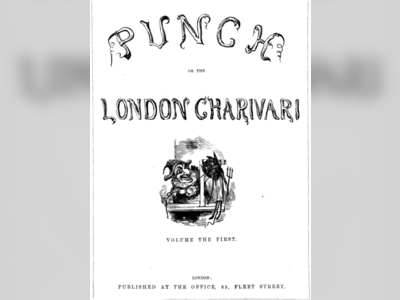British Heritage
Remember, Cherish, Learn.
beta
Daily Mail
Contribution of the Daily Mail to British Heritage.
The Daily Mail, a renowned British daily middle-market newspaper, has made significant contributions to British heritage throughout its long and illustrious history since its founding in 1896. As the United Kingdom's highest-circulated daily newspaper, it has left an indelible mark on the country's media landscape and has played a vital role in shaping public opinion and discourse over the years.
The legacy of the Daily Mail can be traced back to its pioneering approach to journalism and its ability to resonate with a wide readership. It was a trailblazer in adopting a more populist and concise tone, setting itself apart from its competitors by catering to the mass market. Its format shifted from broadsheet to a compact tabloid style on its 75th anniversary, May 3, 1971. This strategic decision further enhanced its accessibility and appeal to a broader audience.
The Daily Mail's early success was remarkable, surpassing expectations as it quickly became the largest circulating newspaper in the world by 1902. Its clever marketing and pricing strategy, offering a halfpenny instead of the usual one penny, contributed to its rapid rise. Under the leadership of Alfred Harmsworth and his brother Harold, the newspaper embraced an imperialist political stance, particularly evident during the Second Boer War. This stance resonated with many readers and solidified the paper's reputation as a champion of patriotism and national pride.
The Daily Mail holds a significant place in British heritage as a pioneer in recognizing the potential market of female readers, becoming the first newspaper to introduce a women's interest section. This progressive step paved the way for greater inclusion of women in journalism and acknowledged their importance as a readership demographic.
Additionally, the newspaper's commitment to promoting aviation and technological advancements contributed to the spirit of exploration and innovation in the early 20th century. By offering substantial prizes for aviation achievements, including the first flight from London to Manchester and the first flight across the English Channel, the Daily Mail played a role in fostering developments in the field of aviation, which later proved crucial during wartime and for the advancement of transportation.
Moreover, the Daily Mail's historical reporting reflects the social and political climate of the times. From its early imperialist stance to its reporting on events leading up to World War I, the newspaper's coverage offers valuable insights into the prevailing sentiments and concerns of the British public during critical periods of history.
Over the years, the Daily Mail has received numerous awards and accolades, solidifying its position as a leading media outlet in the United Kingdom. It has been honored with the prestigious National Newspaper of the Year award by The Press Awards on multiple occasions since 1995, exemplifying its consistent commitment to journalistic excellence.
The recognition as the 'Daily Newspaper of the Year' for 2020 by the Society of Editors further highlights the newspaper's ongoing relevance and impact in the contemporary media landscape.
Despite its successes, the Daily Mail has faced its share of criticisms and controversies. It has been widely criticized for sensationalist reporting, inaccuracies, and scaremongering in the fields of science and medical research. Instances of plagiarism and copyright infringement have also tarnished its reputation at times.
In the digital era, the newspaper's online platform, MailOnline, has attracted a vast readership, with over 218 million unique visitors per month. However, the transition to online news has brought new challenges, as the digital realm demands a higher level of accuracy and accountability in reporting.
In conclusion, the Daily Mail's legacy in British heritage is firmly established as a pioneering newspaper that revolutionized the media landscape with its populist approach and concise format. Its contributions to British heritage can be seen through its role in promoting female readership, supporting advancements in aviation, and providing valuable insights into the social and political climate of various historical periods. Despite facing criticisms and challenges, the Daily Mail remains a prominent and influential voice in British journalism, continuing to shape public discourse and contribute to the nation's media heritage.
Legacy and Success
The legacy of the Daily Mail can be traced back to its pioneering approach to journalism and its ability to resonate with a wide readership. It was a trailblazer in adopting a more populist and concise tone, setting itself apart from its competitors by catering to the mass market. Its format shifted from broadsheet to a compact tabloid style on its 75th anniversary, May 3, 1971. This strategic decision further enhanced its accessibility and appeal to a broader audience.
The Daily Mail's early success was remarkable, surpassing expectations as it quickly became the largest circulating newspaper in the world by 1902. Its clever marketing and pricing strategy, offering a halfpenny instead of the usual one penny, contributed to its rapid rise. Under the leadership of Alfred Harmsworth and his brother Harold, the newspaper embraced an imperialist political stance, particularly evident during the Second Boer War. This stance resonated with many readers and solidified the paper's reputation as a champion of patriotism and national pride.
Contribution to British Heritage
The Daily Mail holds a significant place in British heritage as a pioneer in recognizing the potential market of female readers, becoming the first newspaper to introduce a women's interest section. This progressive step paved the way for greater inclusion of women in journalism and acknowledged their importance as a readership demographic.
Additionally, the newspaper's commitment to promoting aviation and technological advancements contributed to the spirit of exploration and innovation in the early 20th century. By offering substantial prizes for aviation achievements, including the first flight from London to Manchester and the first flight across the English Channel, the Daily Mail played a role in fostering developments in the field of aviation, which later proved crucial during wartime and for the advancement of transportation.
Moreover, the Daily Mail's historical reporting reflects the social and political climate of the times. From its early imperialist stance to its reporting on events leading up to World War I, the newspaper's coverage offers valuable insights into the prevailing sentiments and concerns of the British public during critical periods of history.
Contribution to British Heritage through Awards and Recognition
Over the years, the Daily Mail has received numerous awards and accolades, solidifying its position as a leading media outlet in the United Kingdom. It has been honored with the prestigious National Newspaper of the Year award by The Press Awards on multiple occasions since 1995, exemplifying its consistent commitment to journalistic excellence.
The recognition as the 'Daily Newspaper of the Year' for 2020 by the Society of Editors further highlights the newspaper's ongoing relevance and impact in the contemporary media landscape.
Challenges and Criticisms
Despite its successes, the Daily Mail has faced its share of criticisms and controversies. It has been widely criticized for sensationalist reporting, inaccuracies, and scaremongering in the fields of science and medical research. Instances of plagiarism and copyright infringement have also tarnished its reputation at times.
In the digital era, the newspaper's online platform, MailOnline, has attracted a vast readership, with over 218 million unique visitors per month. However, the transition to online news has brought new challenges, as the digital realm demands a higher level of accuracy and accountability in reporting.
In conclusion, the Daily Mail's legacy in British heritage is firmly established as a pioneering newspaper that revolutionized the media landscape with its populist approach and concise format. Its contributions to British heritage can be seen through its role in promoting female readership, supporting advancements in aviation, and providing valuable insights into the social and political climate of various historical periods. Despite facing criticisms and challenges, the Daily Mail remains a prominent and influential voice in British journalism, continuing to shape public discourse and contribute to the nation's media heritage.
- Daily Mailen.wikipedia.org









